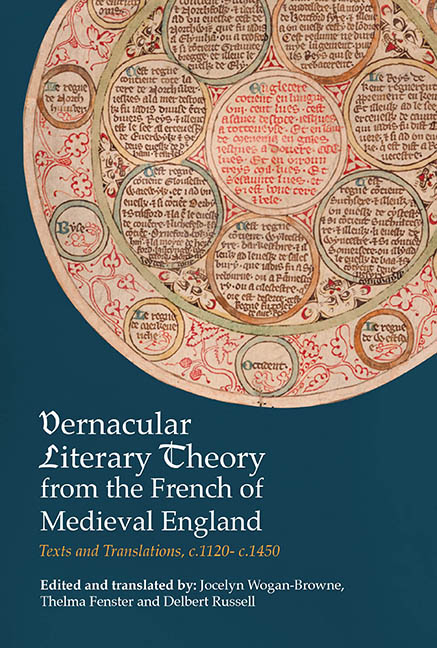 Vernacular Literary Theory from the French of Medieval England
Vernacular Literary Theory from the French of Medieval England Published online by Cambridge University Press: 25 October 2017
Introduction
The needs and responses of inscribed audiences are a frequent rationale for textual composition. Most vernacular works share a conceptualisation of audience-text relations as a face-to-face encounter with the people for whom a text is initially written, whether or not those specific relations were ever actualised or are pertinent to the version of the text in hand. Historical audiences are linked to but do not necessarily remain the same as production communities or textually inscribed communities. Nor are they defined by them as a single hypostasised community of one language or a particular social status. The audience for the ‘Londonisation’ of Brunetto Latini in the Liber custumarum (8a), for instance, probably identified itself not as a francophone community but as members of the occupational sub-groups of a highly variegated civic public: the court, plurilingual administrators, bureaucrats, merchants, urban dwellers of various kinds. So too the Crabhouse nunnery register (36), more concerned with verse and prose distinctions than its own trilinguality, testifies to the mixed and fluid socio-linguistics of female houses, witnessed in the linguistic ranges of their devotional, doctrinal, and administrative texts, and in their ecclesiastical and lay patronage networks.
Part IV's most explicit meditation on audiences and their formation as textual communities is Denis Piramus's prologue to his life of Edmund of East Anglia (27). As Ian Short has shown, this prologue offers considerable thought about vernacular writing (well worth consideration alongside more frequently discussed prologues such as those of Chrétien de Troyes or Marie de France).1 Piramus's prologue plays with the assignation of literary genre to specific class or occupational groups and then transforms, redirects and complicates such correspondences together with the whole question of whether texts are to offer sentence or solace to their audiences. Wace's late-twelfth-century Vie de saint Nicolas (25a) adapts estates theory to form a cult community of audience and narrator. The anonymous thirteenth-century Vie de seint Clement (25b) outlines with mocking wit the usual parameters of academic writing and its ambitions in order to create narration and audience as joined in a textual community pursuing more useful and less well-known material and readings. A stylish piece of niche marketing, this prologue sets up a pace and intimacy sufficient to sustain with brio the succeeding 15,000 line vernacularisation of the Clementine Recognitions.
To save this book to your Kindle, first ensure no-reply@cambridge.org is added to your Approved Personal Document E-mail List under your Personal Document Settings on the Manage Your Content and Devices page of your Amazon account. Then enter the ‘name’ part of your Kindle email address below. Find out more about saving to your Kindle.
Note you can select to save to either the @free.kindle.com or @kindle.com variations. ‘@free.kindle.com’ emails are free but can only be saved to your device when it is connected to wi-fi. ‘@kindle.com’ emails can be delivered even when you are not connected to wi-fi, but note that service fees apply.
Find out more about the Kindle Personal Document Service.
To save content items to your account, please confirm that you agree to abide by our usage policies. If this is the first time you use this feature, you will be asked to authorise Cambridge Core to connect with your account. Find out more about saving content to Dropbox.
To save content items to your account, please confirm that you agree to abide by our usage policies. If this is the first time you use this feature, you will be asked to authorise Cambridge Core to connect with your account. Find out more about saving content to Google Drive.